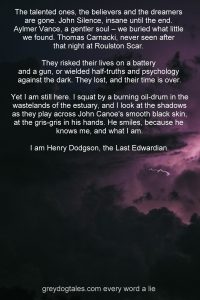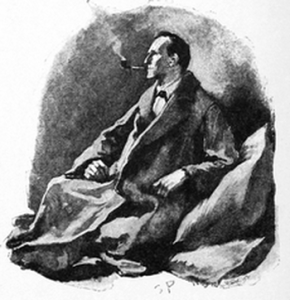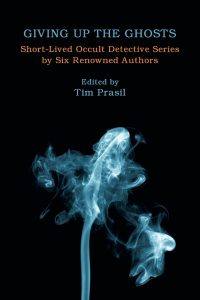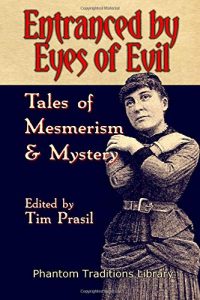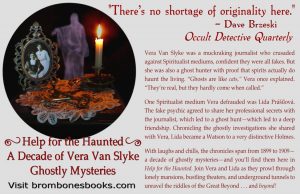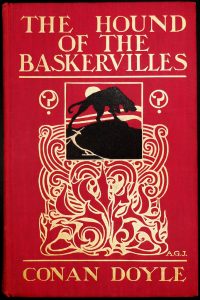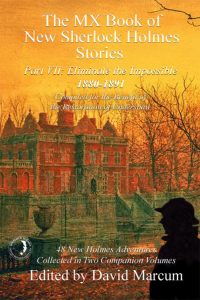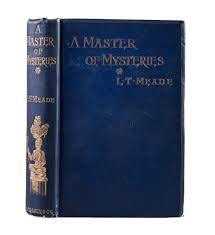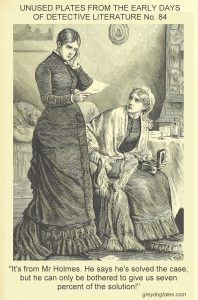So, are you interested in submitting a story to a new anthology? And will it be extraordinarily exciting, devilishly clever, cunningly mysterious, and have Sherlock Holmes teaming up with one or more occult detectives? Then read on, for today we have the serious details on pitches, pay and plans. And supernatural fiction historian (and writer) Tim Prasil calls by to suggest a few characters.
As we said in our last article, John Linwood Grant is editing the Sherlock Holmes and the Occult Detectives anthology for Belanger Books. JLG is the author of both Holmes stories and occult detective stories – even the two at once occasionally, as part of his ‘Tales of the Last Edwardian’ series. And as a harassed writer, he also knows that what you really want to hear right now is How Long, How Much, and When. Let’s get those out of the way before we explain exactly what’s required.
Sherlock Holmes and the Occult Detectives
Belanger Books
Core concept: A 5,000 – 10,000 word traditional Sherlock Holmes and occult detective “team up” story.
Payment: Authors shall receive a payment of $50 plus a percentage of the Kickstarter project profits (expected minimum payment of $100), and a paperback copy of the anthology.
Rights: Authors shall retain rights to their work. We only retain the rights to the story within the publication.
Pitch Deadline: March 15, 2019
Submission Deadline: July 15, 2019
Note: Kickstarter will run in November 2019 and publication of book will occur in December 2019.
What We Want
This bit is detailed, not because it’s a terribly complex idea, but because it all increases the chances of us taking your story. And it has a few hints. The more in tune with us you are, the more we’ll wag our tails when we read your submission. If you’re confident that you’ve already grasped the concept, or you’re an experienced writer, you might decide to use it just to double-check. We’d still prefer you read it through.
We want stories which have all the following – four straightforward key elements:
- Sherlock Holmes (and/or Watson) as a key protagonist; a proper, authentic Conan Doyle-type Holmes, in full character.
- One or more occult detectives, as the other key protagonist(s), ones who could have taken up a case at the same time as Holmes was alive and functioning. This means Public Domain figures from around 1875 – 1925* OR your own original character operating in the same time period. These are also encouraged.
- A strong supernatural, paranormal, occult, psychic or other ab-natural element which is crucial to the story. As mentioned last time, you CAN try a ‘debunking’ tale, where a mundane explanation ensues, but we won’t take many of those.
- An actual case/investigation – not Holmes and Carnacki happening to see a ghost pass by, whilst they argue about camera techniques over coffee.
We do not want time-travel stories or steampunk – or Lovecraftiana, unless the latter is very clever, subtle and original, in which case we might have a glance. Think Algernon Blackwood, William Hope Hodgson, Arthur Machen, L T Meade and so on. Late Victorian, Edwardian and Twenties scariness.
* Do check the occult detective is in the Public Domain. Seventy years after the author’s death is the usual rule-of-thumb, except for some important characters where an Estate is still active and protecting its copyrights. Conan Doyle and Agatha Christie, for example.
The Pitch
It’s possible to do this sort of thing and end up with blocks of similar stories, however well written they are. Seventeen cases where Holmes and Dr Hesselius prove that the apparition at Gruntling Hall was in fact the butler in a sheet (but that the family was genuinely cursed anyway, because a wicked ancestor ate cheese too late at night). Or ten cases of werewolves, phosphorescent pain and missing boots.
For this anthology, we would like short pitches – say a hundred to two hundred words or so (the paragraph above is seventy words, as an example) – telling us about your planned story:
- The decade and general physical setting(s), e.g. London; a decaying Cornish farmhouse, before WWI; a fancy hotel in Paris.
- The sort of supernatural threat/mystery, e.g. classic ghostly appearances; physical monstrosity on the loose; madman possessed by something; cursed item. Get us intrigued.
- The occult detective(s) involved, e.g. Van Helsing late in his career; John Bell having decided spirits do exist; Carnacki at his wits end and needing a co-conspirator.
- A hint of plot, to show you have a story broadly in mind.
If you’ve never pitched before, have a go at it, and we’ll tell you if you have something there which we think is worth pursuing. If you’ve done it before, you know the drill.
The authors of the pitches we like will be invited to write up a full submission for possible inclusion, so you’ll then have a further three months. No guarantees, but it means that you’re at least on the right lines, so your chances go up.
PITCHES ONLY TO occultholmes@virginmedia.com BY 15TH MARCH, PLEASE
The Occult Detectives (aka The Doomed Meddlers)
No, they’re not always doomed, we just like the term. They risk their lives, their sanity or their bank balances in the investigation of the dark and mysterious. Holmes you should already know, but what about the characters he will work with here? You have a wide range of possibilities open to you, and yes, we may well take more than one team-up with the same occult detectives (from different authors), if the stories are that good.
We hand over for a moment to Tim Prasil, a keen anthologist of early supernatural stories and the creator of Vera van Slyke, his own dauntless investigator…
Prasil on Paranormal Protagonists
Some fictional occult detectives contemporary with Sherlock Holmes are well-recognized: William Hope Hodgson’s Thomas Carnacki and Algernon Blackwood’s John Silence lead the team with Arthur Machen’s Dyson and Richard Marsh’s Augustus Champnell close behind. However, there are lesser known characters who, were they to cross paths with Holmes, might result in an interesting adventure. Were one to ask me to name my Top Five Lesser-Known Occult Detectives Contemporary with Sherlock Holmes, I would gladly name them—even if the one asking had a chronic infatuation with a dog-deer crossbreed known as “lurchers.”
- We start with the hazy and unnamed investigator in H.G. Wells’ “The Red Room” (1896). What brought him to Lorraine Castle to investigate its fearful Red Room? What is his relationship to the young Duke, the unfortunate fellow who “had begun his dying” after merely opening the door to the Red Room? We know Wells’ protagonist arrives as a skeptic (as do others on my list), so how does his experience change him?
- While we’re on the subject of potentially converted skeptics, let’s consider Lady Julie Spinner, a promising character in a disappointing novella by an anonymous author. The piece is titled “Wanted—An Explanation” (1881), wherein Lady Julie says, “I have been a hunter of ghosts all my life, and have never been able even to meet with a single person who has seen one.” However, after being stymied by the strange events at Hunt House, does her view of the boundaries of reality expand?
- From Lady Spinner, we move to Lord Syfret. The adventures of this serial character might be a bit tough to locate, but Arabella Kenealy’s series of short stories titled Some of Lord Syfret’s Experiences has been reprinted by Coachwhip Press. That is, seven of them appear in that reprint, and one source reports that eleven tales appeared in Ludgate magazine in 1896 and 1897. Here’s a borderline occult detective that’s awaiting a full resurrection by a literary detective, if not a creative writer.
- Enough with the nobility—let’s look at a duo that beat Mulder and Scully by roughly a century. Miss Erristoun and Mr. Calder-Maxwell investigate the title room in Lettice Galbraith’s “The Blue Room” (1897). The story is remarkably Victorian in that Miss Erristoun is reduced from a gutsy rebel to a wilting maiden-in-distress (one who marries the man she earlier waved off as wanting to tame her). But what if that marriage crumbled quickly, and she rejoined the scholarly Calder-Maxwell to investigate other cases of ghosts-that-aren’t-really-ghosts-at-all?
- I end with what would amount to a crossover of Arthur Conan Doyle and Arthur Conan Doyle. Dr. Hardacre, in ACD’s “The Brown Hand” (1899), is a doctor whose hobby is psychical research and who, upon solving his rich uncle’s otherworldly problem, winds up in a very nice position to make probing occult mysteries his full-time job. No doubt, he and Dr. Watson might have a jolly time debating diagnoses: demon possession or delirium tremens—lycanthropy or laryngitis?
Links to all of these stories—except the mildly elusive Lord Syfret ones—can be found on either the Chronological Bibliography of Early Occult Detectives or the Legacy of Ghost Hunter Fiction bibliographies at my Brom Bones Books website.
We have our own set of perhaps lesser known potential characters, such as:
- Gerald Canevin, of Henry S Whitehead’s Caribbean tales;
- Alice & Claude Askew’s Aylmer Vance
- The young woman of Ella Scrymsour’s stories – Shiela Crerar, Psychic Investigator;
- John Bell, the confirmed and determined sceptic of L T Meade & Robert Eustace**;
- Dr. Martin Hesselius created by Joseph Sheridan Le Fanu;
- Flaxman Low, from the pen of ‘E & H Heron’.
** L T Meade & Robert Eustace also wrote three tales of a palmist, Diana Marburg.
And the pages of the magazine Occult Detective Quarterly might provide more general inspiration – there are great period tales therein of Aaron Vlek’s Geoffrey Vermillion (ODQ #4), Amanda DeWees’ Sybil Ingram (#1 & ODQ Presents), Joshua M Reynolds’ Charles St.Cyprian (# 1 & #4), Melanie Atheron Allen’s Simon Wake (#3), Aaron Smith’s Miss Mason (#3) and more. You can’t nick their characters, though.
NOTE: Ace storyteller Willie Meikle, who has chronicled Carnacki’s further adventures at length, even provided a supernatural Holmes story, ‘The Ghost Shirt’, in ODQ#3, and Brandon Barrows wrote a tale of Carnacki in his earlier years, ‘The Arcana of the Alleys’, for #2 .
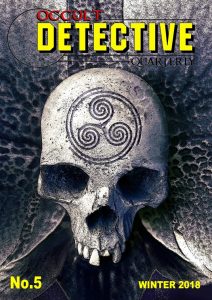
Please note that we don’t want lots of laboured and archaic speech, or an excess of Cockney chimney-sweeps and ridiculously posh-talking nobility. Moderate and appropriate use of contractions and period slang, cant and vernacular, please.
A Note on Inclusivity and Discrimination
It was perfectly possible in late Victorian, Edwardian and 1920s Britain to be active and respected whilst being a feminist, being black, being gay or being restricted in physical ability (as just a few examples). Don’t limit the scope of your characters’ personal nature, situation or views. Whilst limited situational discrimination may occasionally be relevant in context of the period – in order to reflect characters’ life histories or traumas – sexism, racism etc. in general will not be accepted.
REPEAT REMINDER: PITCHES ONLY TO occultholmes@virginmedia.com BY 15TH MARCH, PLEASE.
General queries on the anthology for JLG (but NOT full submissions) can be sent to the same email address.
More news of other Belanger Books opportunities, strange fiction, supernatural stuff, and goodness knows what in a couple of days…
